- Home
- Beverly Cleary
Sister of the Bride Page 12
Sister of the Bride Read online
Page 12
“Push the thing on top to the right,” directed the clock’s owner.
The clock silenced, Rosemary sat down on the floor to open the gift. She read the card, exclaimed over the wrapping, couldn’t bear to untie the bow—it was so beautiful—accepted a pair of scissors from her hostess, and finally lifted the lid from the box and laid back the tissue paper, revealing a set of linen dish towels printed with herbs, fruits, and vegetables. Through all this, her ring hovered and sparkled and twinkled like Tinker Bell. Never, it seemed to Barbara, had a left hand been so conspicuous.
“Oh, thank you, Mrs. Lessing,” said Rosemary. “They are lovely. And how did you ever know I don’t have a single dish towel?” She had lifted each towel out of the box to admire it and then laid them back to pass around the room for all the Amys to examine. By the time she had done this a second alarm clock jangled, this time from a bedroom.
“Another?” You would think Rosemary had not expected a second gift.
When the second clock was located and silenced, Rosemary returned to the room with a large box, wrapped in paper printed with wedding cakes. “I can’t imagine what could be in such a big package,” she said, and once more read the card. “Why, it’s from Mrs. Carretta!”
Barbara began to wonder how her sister was going to manage to be surprised twenty-eight times in one evening. This gift turned out to be a big cookie jar in the shape of a fat and smiling chef. It was the sort of thing Rosemary did not like, but she removed the head with her left hand and peeked inside, exclaiming, “It’s going to keep me busy filling this up for Greg. Thank you, Mrs. Carretta.” Anyone would think Rosemary had been hoping someone would give her a cookie jar exactly like this.
Clocks continued to buzz, clatter, and jangle at regular intervals. The pile of gifts and ticking clocks beside Rosemary grew. “If this keeps up, she’ll get the big head before the wedding is over,” Gramma was heard to remark to the Amy sitting next to her. Rosemary pretended not to hear and continued to be surprised and delighted. Barbara genuinely admired her sister’s performance, all the more so because her own face was beginning to feel a little stiff from smiling and exclaiming and admiring so much. Pumpkin-colored towels, a casserole, a set of canisters, a wooden salad bowl, two aprons…
One alarm clock produced two gifts. The first was a recipe file, containing the favorite recipe of each Amy. “Why, this one isn’t for me,” said Rosemary, as she picked up the second gift and read the card, “To Nancy Bodger, my Secret Pal. She is really quite a gal.”
“For me?” exclaimed Mrs. Bodger, taking the gift and examining the card. “I can’t imagine who it’s from. I don’t recognize the printing.”
Barbara could hardly keep from giggling. The Amys were always rhyming gal and pal. She sought her sister’s eye to exchange a private look that would say, How like the Amys! But the smiling eyes of Rosemary refused to be caught. She was much too busy looking at the recipe file she had just received. “I can’t wait to try all these recipes,” she was saying. Barbara felt lonely and left out. She smothered a yawn.
“Thank you, Secret Pal, whoever you are,” said Mrs. Bodger when she had opened her gift, a pair of sequin-trimmed pot holders. “Just what I’ve always wanted.”
As Rosemary’s pile of gifts and ticking clocks continued to grow, Barbara found it more and more difficult to smile. A cookbook, more linen dish towels, a set of pink bathroom towels with elaborate hand-crocheted borders from Gramma, who said, “I do like to see pretty colors in a bathroom,” and Barbara’s candlesticks, looking impractical among the practical gifts. “I love them!” cried Rosemary, when she had undone the olive green paper, and Barbara found it difficult to return her smile. Her legs were beginning to feel cramped from sitting on the floor. Her left foot was asleep.
Barbara was embarrassed when Aunt Josie patted her hand and said loud enough for all to hear, “You just wait. Your turn is coming.” Oh, don’t mind me, Barbara thought, I’m just the sister of the bride.
The Amys all laughed affectionately, and Barbara smiled with stiff lips. I’m jealous, she thought miserably. Green-eyed over a lot of dish towels. She would feel better, she knew, once she and Rosemary were home behind the closed door of their room, where they could break down with laughter over the Amys. Sequin-studded pot holders from a Secret Pal! How typical and how delicious!
Still the alarm clocks rang and still Rosemary sustained her performance. Her engagement ring sparkled over the growing pile of gifts. Not once did her delight and enthusiasm flag. Barbara shifted her legs from one side to the other, because her right foot was beginning to go to sleep. She struggled to hide her letdown feeling by sitting up straight and trying to look vivacious. The most admired gift of all was Mrs. MacLane’s set of stainless-steel mixing bowls. Every one of the Amys, it seemed, had always wanted a set of such bowls. If the recipe called for melted shortening, it could be melted right in the bowl, eliminating one pan to be washed. This confirmed Barbara’s feelings that they were all bound to their kitchen stoves. Every last one of them. There was no poetry in their souls. Just recipes.
The last gift, which Rosemary located in the kitchen in the oven, was anonymous. It turned out to be a rolling pin, and Rosemary laughed as heartily at this joke, symbol of a henpecking wife, as if she were a genuine Amy. Barbara managed a laugh, too, taking her cue from Rosemary. Humoring the hostess in her little joke was the polite thing to do. Her real laughter would be shared with Rosemary at home.
The show was over, the club broke up into groups, and Mrs. Bodger produced cookies, coffee, and ice cream molded in the shape of wedding bells. As Barbara had anticipated, several Amys protested, “There goes my diet!” The ice cream had been molded so hard to make it hold its shape that it was impossible to cut it with a spoon, so the Amys chatted while they chipped away at their wedding bells, waiting for them to soften. Barbara found herself listening to stray bits of conversation that flew about the room. She learned that Mrs. Ellowitz’s daughter, who had gone East to college, felt that her mother used too many dashes in her letters. The Amys thought this was extremely funny and agreed that it must be difficult to write to a daughter who had become a literary critic during her first year in college. She learned that Mrs. Baylis’s son had had a difficult time selecting a birthday gift for his girl—nothing his mother suggested was right—but he had finally—thank goodness!—settled on artificial pearls. This was interesting to Barbara, who had not realized that Jim Baylis and Betsy, whom she knew at school, had reached the gift-exchanging stage.
For a moment Barbara wished Bill Cunningham’s mother was an Amy. She might have learned something interesting about him—whom he was taking to his graduation party, for example—but of course Mrs. Cunningham would never waste her time with a club like the Amys. She was too busy with her career and too tired from her commute to the city.
Barbara found herself being drawn into one of the groups of mothers, who were obviously being kind because she looked left out.
“Won’t Rosemary make a lovely bride?” remarked Mrs. Tolfree to Barbara, but glancing across the room at Rosemary.
“Yes.” Barbara could not think of anything to add. Rosemary, surrounded by admiring mothers, looked pretty and radiant, just the way a bride should look. She used the hand that bore her engagement ring as self-consciously as if she were wearing wet nail polish.
“Just lovely,” agreed the others. Barbara wondered why she felt so tired. She wanted the party to end, and she was sure no one would say she would make a lovely maid of honor tonight.
“Brides of today are certainly different from those of our generation,” remarked Mrs. Tolfree. “I can’t think of a single girl, when I was in college, who went on to school after marrying.”
“They marry so young nowadays,” said another Amy, and it seemed to Barbara she sounded a little sad, as if marrying young was something to be sorry about.
Barbara felt it was time for her to contribute to the conversation, so she said earnestly, “Rosem
ary feels that if she didn’t go on to school she might not use her mind. Rosemary feels it is important for women to use their minds.”
She spoke into one of those sudden silences that fall in any crowd and was quite unprepared for the reaction to her remark. Gramma was first to speak. “Oh, for pity’s sake!” she exclaimed, as if exasperated with such nonsense.
Barbara was embarrassed by the laughter of the entire roomful of Amys. Hoping at least for silent support, she glanced at Rosemary and saw that she, too, was embarrassed. Me and my big mouth, thought Barbara miserably. She would never hear the last of this. Once the Amys got hold of something to laugh at they never let it drop. They could keep one wretched little joke alive for months, even years. Now they would be asking her if she was using her mind every time they saw her. She could hear them already. Why hello, Barbara. Still using your mind?
“Addie, do you ever worry about using your mind?” one Amy asked another.
“Using it!” Addie Smith said with a laugh. “With four children it’s all I can do to keep from losing it! Meals to plan, washing to do—why, just the laundry alone…”
She needn’t sound as if she bent over a scrubbing board, thought Barbara, her feelings still ruffled by the laughter she had brought forth. She knew perfectly well that Mrs. Smith had both an automatic washer and a dryer.
“The chauffeuring to ballet lessons and dental appointments,” continued another mother.
“The P.T.A.,” chorused several.
“Brownies and Cub Scouts,” someone added.
“But I used to feel exactly the same way as the girls,” said one of the members, taking Barbara’s side. “When I was first married I conscientiously went to the library once a week and followed a reading list on world affairs. I didn’t want to stagnate just because I was married. Until the children came, that is. After that I didn’t have much time for world affairs. I was too busy on the home front.”
Thank you, thought Barbara.
“Why, that’s right,” said someone, remembering. “When the Amys first became a club we used to give book reviews. I remember giving Jan her bottle while Addie reviewed The Grapes of Wrath.” Jan was now married and had two babies of her own.
Gramma leaned over and patted Rosemary’s hand. “May all your troubles be little ones.”
The Amys all laughed affectionately at Gramma’s old joke and at Rosemary’s pretty confusion. Each had her own memory of the early days of the Amys to share with someone, and soon the club had broken up once more into chatting groups. To cover up her embarrassment Barbara passed cookies and helped Mrs. Bodger carry plates and coffee cups into the kitchen. She felt somewhat better when she overheard an Amy murmur, “The MacLane girls are both lovely girls.” But her pleasure was immediately tempered when the woman added, “Their mother has done such a good job on them.” Barbara did not like to think of herself and her sister as a job her mother had done, as if she and Rosemary were pieces of silver to be polished.
Barbara was glad when the party was finally over and they could say good-bye to the Amys and carry Rosemary’s gifts out to the car. She rode in the backseat beside the gifts with a casserole on her lap.
“It was a nice party, wasn’t it?” remarked Mrs. MacLane, as she backed the car around and headed toward home.
“Just lovely,” agreed Rosemary.
“Marvelous loot,” was Barbara’s comment. She was looking forward to talking over the party with Rosemary when their mother was not present. She and Rosemary always talked over parties while Rosemary put up her hair, a custom she was going to miss when Rosemary was married.
The only place in the MacLanes’ crowded house to store the gifts was in the corner of Barbara and Rosemary’s room, and when all the boxes were neatly stacked on the floor and the door was shut, Barbara flopped on her bed and kicked off her shoes. “You said there would be a present from Mrs. Bodger’s Secret Pal,” she crowed.
Rosemary smiled but said nothing as she pulled off her dress and slipped into her robe.
“And wouldn’t you just know the Amys would think up something like hiding alarm clocks with all the presents?”
“Oh, I don’t know,” murmured Rosemary, as she sat down at her desk. “I thought the whole thing was sweet myself.”
Barbara sat up and stared at her sister. “Did you even think it was sweet when they talked about their diets?” she asked incredulously. “All that talk about no starches and Metrecal for lunch.”
“Some of them do have to watch their weight,” Rosemary pointed out. “Lots of people do in middle age.”
Well. This was a surprise. Barbara was both disappointed and hurt. Her sister had gone over to the enemy camp…well, not the enemy camp exactly. Mothers weren’t enemies. She was a…traitor to her own generation. No, traitor wasn’t the right word either. Barbara wondered why such warlike words came to mind when she thought about the friction between the generations. “You’d better look out,” she said, “or you’ll turn into an Amy yourself someday. You’ll go around laughing at your children and talking about diets. You might even have a Secret Pal who gives you pot holders trimmed with sequins.”
“I doubt it,” said Rosemary as she opened her notebook, “but next semester I think I’ll join the Dames.”
“And what are the Dames?” demanded Barbara, beginning to undress.
“A club for wives of students,” answered Rosemary.
“What do they do?” Barbara was always curious about university life.
“Oh—things like having someone talk on nutrition and how to get the most out of the food dollar,” said Rosemary.
At least this was on a higher plane than the Amys, who were inclined to exchange cookie recipes. It was evidence that the Dames used their minds.
“And at the end of each semester there is a party,” continued Rosemary with a mischievous smile. “That is when the girls who work while their husbands go to school are awarded their PhT degree.”
Barbara had heard of a PhD degree, but never of a PhT. This was a new one. “What does that stand for?” she asked, pulling on her nightgown.
“Putting Hubby Through,” answered Rosemary, laughing.
Barbara groaned. “They sound every bit as bad as the Amys. Worse even.”
“Maybe,” agreed Rosemary, “but they have fun.” She thought a moment before she said, “And so do the Amys.”
Barbara slipped into bed and snapped off her light. “You just wait,” she said darkly. “Someday you will have a Secret Pal.”
“It might even be fun,” said Rosemary calmly from the circle of light cast by her study lamp. “And in the meantime I will use my mind by applying it to Plato.” She, too, might have been making fun of Barbara’s remark, even though it had been hers to begin with.
“You’re not going to study,” protested Barbara incredulously, “not after a party!”
“Far, far into the night,” answered Rosemary, reaching for a roller for her hair. Since she had gone away to college, she had learned to put up her hair while reading. It was a great time-saver.
Barbara closed her eyes and pretended to be asleep, but for a long time she lay awake, engulfed in a new feeling of loneliness. She was losing Rosemary, and it hurt. She was going to miss poking fun at her mother’s club; she was going to miss talking over parties. She already missed sharing the same instant understanding of a situation…. She missed a lot and was going to miss a lot more…. But Rosemary was right about one thing. It had been sweet of the Amys to give the shower…alarm clocks and all.
Chapter 9
One evening a few days after the shower Rosemary telephoned to say that because Millie did not have much money, she had decided the bridesmaids should make their dresses for the wedding. This meant Mrs. MacLane and Barbara would have to make the maid-of-honor dress. The patterns and material had been chosen and Rosemary, in a burst of efficiency, had bought Barbara’s material and was having the store send it to Bayview. It was sea spray green organza.
Barbara was disappointed at this news. She had pictured a day of shopping and lunch in San Francisco. And what did she get? A sewing job. Mrs. MacLane, although she was glad to save money, was even more disappointed. She could not imagine when they would find time to make a dress, particularly a dress of organza, which was so slippery to work with. Rosemary seemed to think she was the only member of the family who had anything to do. Perhaps it was natural for a bride to become self-centered with all the attention showered on her, but…
The second bit of news that affected Barbara was even more of a disappointment. Greg had chosen his brother, Bob, a premedical student, to be his best man, which was what Barbara had expected, but the two ushers he chose were both married. This sharply reduced the eligible-man-per-bridesmaid ratio and would, Barbara felt, spoil some of the fun. Oh well. She still had—sort of—Bill Cunningham, even if, in the press of wedding preparations, she was reduced to buying a bag of cookies at the bakery.
“Now, Barbara, you mustn’t be disappointed,” said Mrs. MacLane when Barbara had expressed her feelings about ushers with wives. “It is Rosemary’s wedding, you know.”
“I know,” agreed Barbara. “But weddings are supposed to be fun.”
Mrs. MacLane looked amused. “There’s no reason why you can’t have fun.”
“Oh, Mother, you know what I mean,” answered Barbara. “A lot of old married men—”
“I’m afraid I do know what you mean.” Mrs. MacLane looked even more amused. “You were counting on falling in love with someone in the wedding party.”
Barbara did not answer. Her mother need not have put it so directly. Besides, it was not true. She had Bill Cunningham, didn’t she? Well, didn’t she?
One evening Aunt Josie came over with a copy of Vogue to show Mrs. MacLane a picture of a wedding gown. It was a linen dress, worn with a lace veil. Wouldn’t it look smart on Rosemary? Barbara studied the picture without enthusiasm. A bride should not look smart. She should look beautiful and romantic. While the two women were discussing wedding dresses, Gordy slouched into the room and leaned against the doorjamb, his arms folded, listening without expression to this feminine conversation. He did not say anything. He just listened, bringing the conversation to a standstill.

 Ramona Quimby, Age 8
Ramona Quimby, Age 8 Dear Mr. Henshaw
Dear Mr. Henshaw Beezus and Ramona
Beezus and Ramona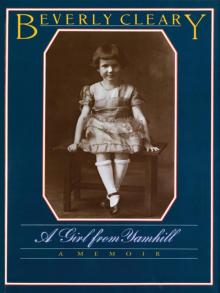 A Girl from Yamhill
A Girl from Yamhill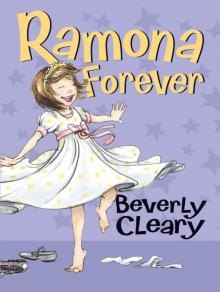 Ramona Forever
Ramona Forever Jean and Johnny
Jean and Johnny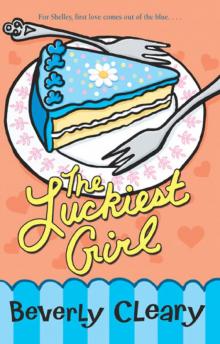 The Luckiest Girl
The Luckiest Girl Emily's Runaway Imagination
Emily's Runaway Imagination Ribsy
Ribsy Ramona the Pest
Ramona the Pest Socks
Socks Ramona's World
Ramona's World Strider
Strider The Mouse and the Motorcycle
The Mouse and the Motorcycle Henry and the Paper Route
Henry and the Paper Route Ramona the Brave
Ramona the Brave Henry Huggins
Henry Huggins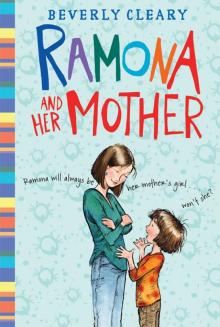 Ramona and Her Mother
Ramona and Her Mother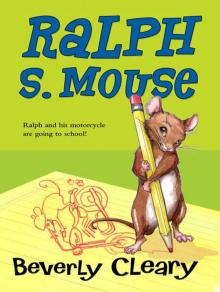 Ralph S. Mouse
Ralph S. Mouse Sister of the Bride
Sister of the Bride Henry and the Clubhouse
Henry and the Clubhouse Muggie Maggie
Muggie Maggie Runaway Ralph
Runaway Ralph Ramona and Her Father
Ramona and Her Father Henry and Ribsy
Henry and Ribsy Henry and Beezus
Henry and Beezus Two Times the Fun
Two Times the Fun Fifteen
Fifteen Mitch and Amy
Mitch and Amy